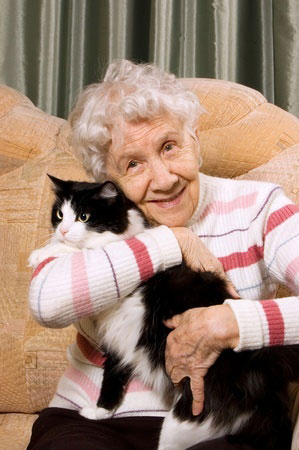 Occasionally, the only thing standing between seniors and the prospect of a new lifestyle in one of the comfortable retirement apartments available in Cincinnati today is a beloved pet.
Occasionally, the only thing standing between seniors and the prospect of a new lifestyle in one of the comfortable retirement apartments available in Cincinnati today is a beloved pet.
Have no fear. Not only do many communities welcome the feline companions of residents, but, with the right accommodation, cats tend to adjust quite well to new living environments— and often become targets of affection from neighboring residents as well as their doting owners.
And as October 29 is Cat Day, we thought it would be the perfect time to consider just what it is that can keep your cat purring as you plan your new life together in a retirement community.
1. Set up a Safe Environment.
Cats, of course, are perfectly happy indoors and adapt very well to small-space living. Inside cats are safe from predators; they do not have to forage for food, and they are often treated like members of the family. Just be certain to provide comfortable places for Kitty to sleep and nap, provide good food at regular intervals, maintain a proper environment for its "natural" needs (including scratching and play).
Even though cats are notoriously independent, you will be rewarded with the presence of a lively, healthy and well-behaved companion. Chances are that the new move will be a happy one.
2. Make Sure that Your Cat Gets Plenty of Exercise and Stimulation.
Daily exercise is vital—both mental and physical. Toys that bounce, shake, rattle or squeak; soft items that can be manipulated, or shiny objects all attract a cat's attention. Small tunnels and mazes, ping pong balls and rubber mice or birds will keep Kitty occupied for hours.
And when it comes to more permanent features, think vertical space. Cats love a perch that allows them to look down on people and objects. Built in shelving or bookcases in a retirement apartments with high ceilings can provide perfect vantage points for those "see everything" cat eyes—especially if you’re dealing with less square footage.
And if you’re concerned that Kitty is going to go to town own your new drapes or apartment-sized furniture, make sure you offer plenty of replacements for unwanted behavior— climbing towers in a corner, scratching boxes or posts in multiple rooms or explore preferred alternatives to having a cat declawed.
Your cat is like a curious child— having plenty of toys to play with and places to explore will help ensure that she’s contented.
3. Be Accommodating.
When you and your pet move into new and unfamiliar surroundings, you can run into a number of different behavioral issues—from spraying or urinating outside the litter box to bursts of disruptive night time activity. Don’t get upset about these sudden changes, it’s only natural for new surroundings and a different schedule to unsettle a pet.
Talk with your vet to get to the root of the problem—disruptive behavior, for example, can be a sign that your cat isn’t getting enough attention or stimulation throughout the day—and take steps to address the underlying issue.
4. Train Your Cat.
You don't have to train her to perform tricks, but you don't want Kitty to try to run out the door every time you leave, either. Using positive reinforcement, you can train your cat to come, or to respond to other simple commands. In the same way, you can key in to your cat's preferences and provide a perch by the window, a special spot for a nap, a corner of the closet to hide in or "hang out," anything that seems especially comforting to your animal.
5. Get Regular Vet Checks.
Not only can animals transmit disease to humans, but cats are also susceptible to some human illnesses. For your own peace of mind, your animal's health and reasonable concern for close neighbors, keep up (or create) an ongoing relationship with your local veterinarian who gives Kitty necessary shots and regular wellness checks.
Healthcare is an important aspect of community responsibility in retirement apartments. Be sure not to neglect this important part of the living arrangement.












